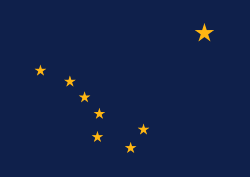Wikijunior:North America/United States/Alaska

Alaska is a U.S. state, located on the northwest tier of North America. It is by far the largest state in area, but one of the least populated. It is the 49th state, having been admitted to the Union on January 3, 1959. The name "Alaska" is most likely derived from the Aleut Alyeska, meaning "great country", "mainland" or "great land". The capital of Alaska is Juneau, and the largest city is Anchorage. Residents are known as Alaskans.

History
[edit | edit source]Humans have lived in Alaska for 13,000 years. Native American tribes that inhabited Alaska included the Inuit, Tlingit, and Yup'ik.
The first European contact with Alaska occurred in the year 1741, when Vitus Bering, a European explorer, led an expedition for the Russian Navy aboard the St. Peter. After his crew returned to Russia bearing sea otter pelts judged to be the finest fur in the world, other fur traders began to sail from the shores of Siberia towards the Aleutian islands. The first permanent European settlement was founded in 1784. New Archangel on Kodiak Island was Alaska's first capital, but for a century under both Russia and the U.S., Sitka was the capital. The Russians never fully colonized Alaska, and the colony was never very profitable. William H. Seward, the U.S. Secretary of State, negotiated the Alaskan purchase in 1867 for $7.2 million. Alaska was loosely governed by the military for years, and was unofficially a territory of the United States from 1884 on.
In the 1890s, gold rushes in Alaska and the nearby Yukon Territory brought thousands of miners and settlers to Alaska. Alaska was granted official territorial status in 1912. At this time the capital was moved to Juneau.
Geography
[edit | edit source]
Alaska is the largest state in the United States, with 663,268 square miles (1,717,856 square kilometers) of total area. It is bordered by the Arctic Ocean to the north, Canada to the east, and the Pacific Ocean to the south. Alaska also shares a maritime boundary with Russia across the Bering Strait. Along with Hawaii, Alaska is one of two states that does not touch another state. Alaska is the northernmost and westernmost state, and also the easternmost, since the Aleutian Islands extend into the Eastern Hemisphere. Alaska has 34,000 miles (55,000 kilometers) of shoreline, the most of any state.
Alaska is home to Mount Denali, the tallest mountain in North America. The state is also home to more than 40 active volcanoes.
The climate of Alaska is classified as oceanic in the south and the southeast, subarctic oceanic in the north, and Arctic in the extreme north. Much of the land in Alaska is covered in permanently frozen soil called permafrost.

People
[edit | edit source]According to the 2000 U.S. Census, 70% of single-race Alaska residents were Caucasian and 16% were Native American or Alaska Native. Multiracial/Mixed-Race people are the third largest group of people in the state, totaling 7% of the population.
86% of Alaska residents aged 5 and older speak English at home. The next most common languages are Spanish, Yupik, Tagalog, and Iñupiaq.
Famous Alaskans
[edit | edit source]- Scott Gomez - first Hispanic player in the National Hockey League
- Jewel - Pop/folk singer
State Symbols
[edit | edit source]- The state is nicknamed The Last Frontier
- The state's motto is "North to the Future"
- The state bird is the willow ptarmigan.
- The state dog is the Alaskan Malamute
- The state fish is the king salmon
- The state flower is the forget-me-not
- The state insect is the four-spot skimmer dragonfly
- The state land mammal is the moose
- The state marine mammal is the bowhead whale
- The state tree is the Sitka spruce.
- The state fossil is the woolly mammoth.
- The state gemstone is jade
- The state mineral is gold.
- The state song is "Alaska's Flag"
- The state sport is dog mushing


